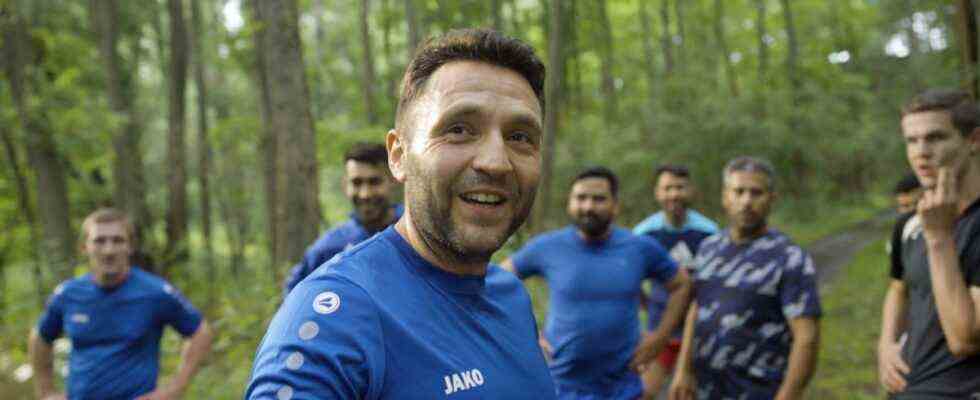Playing football has not always been as easy as it should be in the past two years of the pandemic. While the hygiene concept was being used in the Bundesliga, sports fields were closed for months. Clubs had a hard time keeping their teams together. At SV Blau-Weiss Grana, the coach and captain also had to count once at the end of the first Corona break: “Paul? Injured. Khalifa? Yellow-red. Benni? Pinched his finger. Hasan? Is at work. Darius? I know It doesn’t. Momo? Can’t. Nadji? Isn’t there either.”
Filmmaker Vera Weber accompanied the district league club Blau-Weiss Grana for a season for a documentary series that is launching a new format for serial storytelling on MDR under the label “so close”. Four episodes of about 20 minutes draw the loving portrait of a football team, like there are fortunately still many in Germany: The coach is already thinking about the line-up for the next weekend while he is working, the captain draws a team picture with a pencil, as much as he has he fell in love with the team. The ball somehow arrives on ankle-high grass, and the cigarette before the game is part of it. Ascension is the goal. And the players are from different countries. There are twelve nations in Grana.
The unusual, the sad thing about the history of this team is how it was met – as the series title suggests: “They call us foreign team”. Grana is a suburb of Zeitz, a provincial town in Saxony-Anhalt where the direct mandate went to the AfD in the 2021 state elections. After 2015, many refugees played for Blau-Weiss because their talent was noticed when playing football on the field, and the club needed and wanted them. In 2019, the then Foreign Minister Heiko Maas tweeted: “Solidarity with a team that is doing a great job and is really not having it easy right now!”
In the documentary, the players tell how they defended themselves against racism – and stuck together.
(Photo: MDR/Benjamin Kahlmeyer/MDR/Benjamin Kahlmeyer)
What had happened before had received nationwide attention. An opponent was seriously injured in a duel with Grana’s player Momodou Jawara, whereupon the injured man’s father reported Jawara, who had fled Gambia to Germany. There was talk of intent, although the referee had not noted anything of the sort in the game report. The incident was written down one-sidedly by the local newspaper and then spread on social networks. Racists rushed against Jawara – and the opponents in the district league boycotted Blau-Weiss Grana. Even the shirt sponsor ended its support. “Too many blacks” was the reason given.
The series begins the season after, and players look back at the terrifying events and what grew out of them. They tell how they fought back and stuck together. They talk about the fear that something similar could happen again and why they keep playing anyway. And they talk about their problems, which are more important than football. Paul’s mobile phone credit is only enough for a few sentences when calling his daughter in Gambia. Mahdi from Afghanistan has to pay a lawyer to visit his family.
And Johannes, the drawing team captain, talks about the structural weaknesses in his hometown of Zeitz. There are few reasons for the youth to stay. “At some point you just sit here with the old people,” he says. And you can’t play football forever.
“They call us foreigners team” four episodes in the ARD media library

